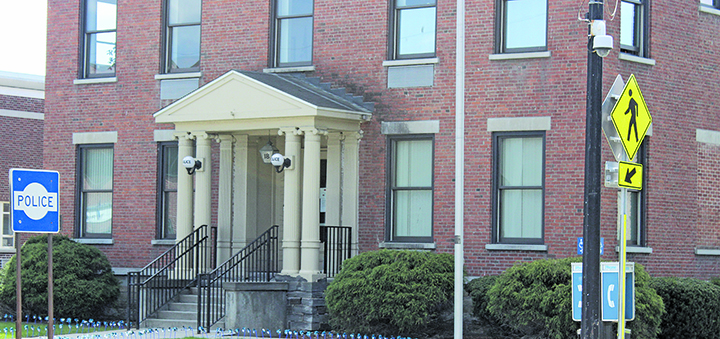NPD And Sheriff's Office To Participate In Mobile Access Program
Published:
August 19th, 2022
By:
Sarah Genter
 The Norwich Police Department and the Chenango County Sheriff's Office have been accepted into the Mobile Access Program, a state-funded program that will provide iPads with AT&T service. The iPads will allow officers to connect individuals experiencing a mental health crisis with mental health providers via video conferencing. (Photo by Sarah Genter)
The Norwich Police Department and the Chenango County Sheriff's Office have been accepted into the Mobile Access Program, a state-funded program that will provide iPads with AT&T service. The iPads will allow officers to connect individuals experiencing a mental health crisis with mental health providers via video conferencing. (Photo by Sarah Genter)
CHENANGO COUNTY — During the joint committees meeting on August 2, City of Norwich Police Department Chief Rodney Marsh announced the Norwich Police Department and the Chenango County Sheriff's Office were accepted into the Law Enforcement Mobile Access Program (MAP).
The program is sponsored by the New York State Office of Mental Health, and will be of no cost to the city or county. Each department will be provided iPads with AT&T cell service, so when officers respond to mental health-related calls, individuals in crisis can speak with a mental health provider almost instantly via video conferencing.
Officers with the NPD and the sheriff's office are trained to respond to these calls, but having instant access to a mental health provider will add another layer of support to both the responding officers and the individuals experiencing a mental health crisis.
"Sometimes it's just someone in crisis or going through a bad time. Sometimes they’re very serious events where someone is thinking of seriously harming themselves. So the officers have to respond and deal with whatever the crisis is that you have, that you’re dealing with at that moment," said Chenango County Sheriff Ernest Cutting. "If they’re someone with a threat to harm themselves or others, those are kind of key indicators for us."
When officers respond to these calls, they must assess the situation to determine if the individual needs to be transported to the Binghamton General Hospital Comprehensive Psychiatric Emergency Program (CPEP).
Oftentimes, those determined to be in need of psychiatric care are transported by an NPD officer or sheriff's deputy. This can mean a one-hour drive in a police car for the individual in crisis, and three-plus hours of time one or more officers spend transporting and filling out paperwork.
The hope is this program will reduce the total number of transports to CPEP.
"If there’s someone who’s suffering through crisis, the last thing we want to do is put them in handcuffs and put them in a caged police car for an hour trip down to Binghamton. So if this is in any way going to reduce those trips, it’s better for the individuals in crisis," said Marsh.
"There are several agencies in the western part of the state that have been using the program since the fall of 2019. On their mental health calls where the iPad/MAP was utilized, there has been a reduction in transports to their CPEP hospitals. I’ve heard both an 81 percent decrease and a 73 percent decrease in transports. Either way, it’s a substantial decrease in transports."
According to Kristen Sauerbier, Mobile Crisis Assessment Team (MCAT) Program Coordinator at the Neighborhood Center — a Utica-based nonprofit that provides behavioral health, child, and family services — MCAT personnel will be working with Chenango County law enforcement on the Mobile Access Program.
"The Mobile Crisis Assessment Team is a division within the Neighborhood Center, so we offer 24/7 crisis services to a six-county region in central New York and the Mohawk Valley," said Sauerbier. "That includes mobile response in person, via telehealth, on the phone, as well as operating a 24/7 local crisis line, and also accepting 988 suicide prevention lifeline calls."
"Law enforcement carrying that ability to connect with a mental health provider with them, and supplying that resource, eliminates so many barriers to being able to engage with a mental health provider otherwise," she continued. "It also provides a more instantaneous response to help engage a client in crisis. So in other words, the client doesn’t have to wait for our provider to drive to wherever they are. It’s an immediate engagement via that video platform."
Sauerbier also explained that, as a diversion program, MCAT aims to keep the clients they see in the community and out of inpatient treatment when possible. For those who don't require psychiatric hospitalization, providers work with them to develop a safety plan, coping skills, social supports, and linking them with outpatient mental health services.
"That may be counseling services, ongoing therapy, perhaps a prescriber if that’s appropriate, any sort of maybe substance use treatment, peer advocacy," said Sauerbier. "Anything that they might need, we can work with making referrals as long as the client is in agreement. We are a voluntary program."
The Mobile Access Program will provide 24/7 access to mental health providers to individuals across the county. Mental health resources are slim in the area, but Cutting said the program will allow the agency to be more proactive in how they approach crisis calls.
"It’s a large county, there’s not a lot of services in the county. So with the mobile access, when we have somebody in crisis it allows us to access, through technology, to reach someone to help someone in crisis to hopefully not take unnecessary trips to get help," said Cutting. "It allows us to be more efficient and proactive in our approach. We’re trying to look ahead at how we can best serve the public or the people that are in crisis, and this was a great opportunity and we’re obviously very happy to be a part of it."
The Norwich Police Department will be receiving two iPads, and the Chenango County Sheriff's Office is expected to receive four. It's anticipated they will receive the iPads sometime this month, and begin training officers to use them.
Author: Sarah Genter - More From This Author
Comments






